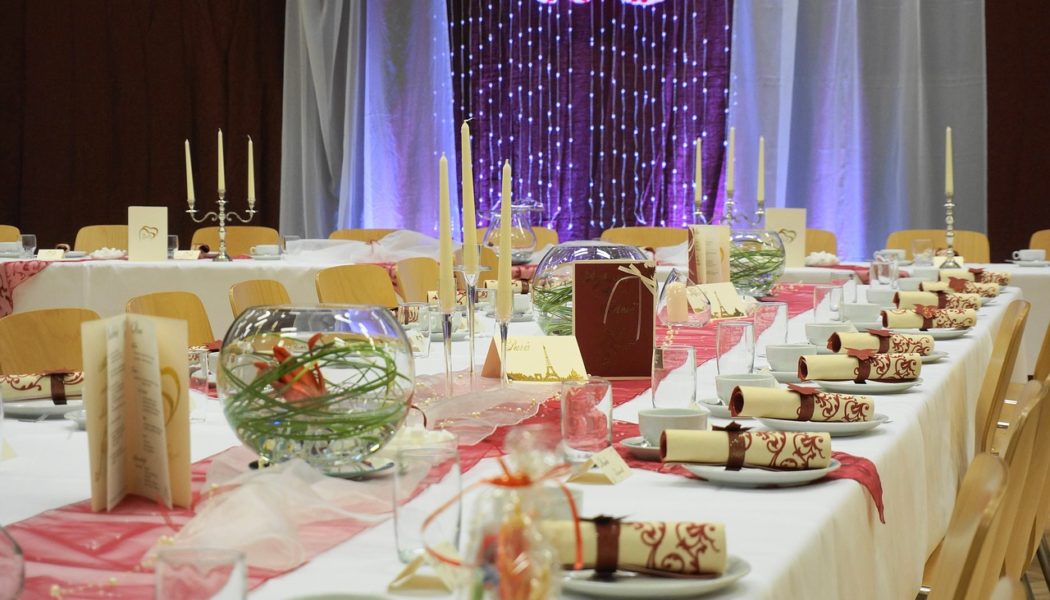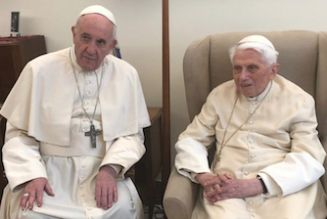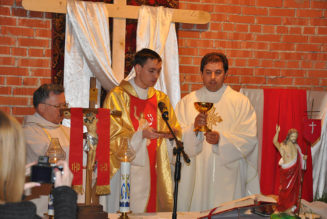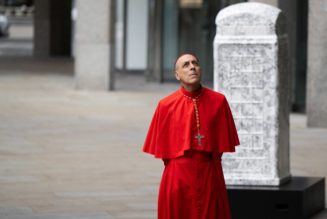
The past three Sundays have featured shocking parables about our readiness, fruitfulness, and decision as to whether to accept and enter the Kingdom of God. The Lord has used the image of a vineyard extensively: a vineyard into which workers are dispatched at different times of the day but who have different attitudes about what is due to them at the end of the day; a vineyard into which two sons are sent, one of whom goes and one who does not; a vineyard in which are wicked tenants who refuse to render rightful fruits to the landowner and who abuse and even kill those sent to call for the harvest, including the landowner’s son.
The parables point to the great and dramatic decision to which we are all summoned: Will we accept the Kingdom of God, entering into to and accepting its terms or not? It is a decision on which your destiny depends. Jesus is not playing around; he lays out the drama in stark and shocking ways. He is not the harmless hippie or mild-mannered Messiah that many today have recast Him to be. He is the Great Prophet, the Very Son of God, the Lord who authoritative stands before us and tells us to decide.
This Sunday’s Gospel is perhaps the most shocking and dramatic of all. In it, the Lord Jesus issues another urgent summons to the Kingdom. As with past Sundays, there is the warning of hellish destruction for the refusal of the Kingdom. This view must be balanced, however, by the vision of a seeking Lord who wants to fill His banquet and will not stop urging us until the end. You might say the theme of this Gospel is “Party or Perish!”
Let’s look at today’s Gospel in five stages.
I. RICH REPAST – The text says, The kingdom of heaven may be likened to a king who gave a wedding feast for his son. He dispatched his servants to summon the invited guests to the feast …
Of course the King is God the Father and the wedding feast is that of His Son, our Lord Jesus Christ. On one level, the wedding feast is the invitation to faith in general. More biblically, the wedding feast is that of the Lamb, which is described in the Book of Revelation (19:7-9). Hence it is also the Liturgy of Heaven in which we share through the Mass.
What a wonderful image of the Kingdom: a wedding feast! Most Jewish people of that time looked forward to weddings all year long. They were usually scheduled between planting and harvest, when things were slower. Weddings often lasted for days and were among the most enjoyable things imaginable. There was feasting, family, and great joy in what God was doing. Now consider the unimaginable joy and honor of being invited to a wedding hosted by a king!
Yes, these were powerful images for the ancient Jews of the Kingdom: A wedding feast, and for a king’s son at that! The joy, the celebration, the feasting, the magnificence, the splendor, the beautiful bride, the handsome groom, the love, the unity; yes, the Kingdom of Heaven may be likened to a king who gave a wedding feast for his son.
Who would not want to come? We may well ask, if this is Heaven, who would not want to go?
II. RUDE REJECTION – The text says, … but they refused to come. A second time he sent other servants, saying, “Tell those invited: ‘Behold, I have prepared my banquet, my calves and fattened cattle are killed, and everything is ready; come to the feast.’” Some ignored the invitation and went away, one to his farm, another to his business. The rest laid hold of his servants, mistreated them, and killed them.
Here is a real twist to the story, an unexpected development. Why the rejection of the king’s offer? In our time, why the rejection of what God offers? Are these people crazy? In effect, Jesus explains their rejection in a two-fold way: worldliness and wickedness.
One group of those rejecting the invitation to the Kingdom of Heaven do so for worldly reasons. Jesus describes them as going one to his farm, another to his business. In other words, the things of the world, though not evil in themselves, preoccupy them. They are too busy to accept the invitation; their priorities and passions are elsewhere.
They think, weddings are nice but money is nicer; God and religion have their place, but they don’t pay the bills.
The goal of the worldly, is this world and what it offers, not God or the things awaiting them in Heaven. Things like prayer, holiness, Scripture, and sacraments don’t provide obvious material blessings to the worldly minded so they are low on the priority list. St. Paul speaks of people whose god is their belly and who have their mind set on worldly things (cf Phil 3:19).
So off they go, one to his farm, another to his business; one to watch football, another to detail his car; one to sleep in, another to go golfing; one to make money, another to the mall to spend it.
A second group of those rejecting the Kingdom do so out of some degree of wickedness. Jesus speaks of how they abuse and even kill those who invite them. Why this anger? For many, the kingdom of God is rejected because it is not convenient to their moral life. Many of them rightly understand that in order to enter the wedding feast of the Kingdom, they will need to be “properly dressed.” Of course “proper dress” here refers not to clothes but to holiness and righteousness, to living the moral vision of the Kingdom.
The invitation to the wedding feast of the Kingdom incites anger because it casts a judgment on some of their behaviors and tweaks their conscience. A great deal of the hostility directed toward God, Scripture, the Church, and her servants who speak God’s truth, is explained by the fact that, deep down, they know that what is proclaimed is true.
If their minds have become darkened or their hearts hardened by sin, they simply hate being told what to do or any suggestion that what they are doing is wrong. Being told to live chastely, or to forgive, or to be more generous to the poor, or to welcome all new life (even if there are deformities or disabilities), or that there are priorities higher than money, sex, career, and worldly access; all of this is obnoxious. Yes, the world often treats God and those who speak of Him with contempt. Some are even martyred in certain places and times.
Of course many who reject the Kingdom do so for multiple reasons, but Jesus focuses on these two broad categories, under which a lot of those reasons fall.
III. RESULTING RUIN – The text says, The king was enraged and sent his troops, destroyed those murderers, and burned their city.
As with last week’s Gospel, there is a shocking detail to the story that is somewhat mysterious. How can such a violent punishment be squared with a vision of God who loves us?
It is not an easy thing to answer, but to respond by pretending that this is not taught or that this will never happen, is to reject the loving urgency with which Jesus speaks. He is not simply using scare tactics or hyperbole; He is teaching us what is true for our salvation.
Historically, this destruction happened to ancient Israel in 70 A.D., forty years after Jesus’ resurrection. After forty years the no of the invited guests (in this case, the Ancient Jews) became definitive and led to their ruin and the end of the temple.
It is the same for us. The Lord invites us all to accept His Kingdom as long as we live. If we are slow to respond, He repeats his offer again and again. In the end, though, if we don’t want to have the Kingdom of God, we don’t have to have it. Upon our death, our choice is fixed. If our answer is no, our ruin is certain, for outside the Kingdom there is nothing but ruins. We will either accept the invitation to live in the Kingdom of God and by its values or we will reject it and make “other arrangements.” Those other arrangements are ruinous.
Be sure of this: God wants to save everyone (cf Ez 18:23, 32, 33:1; 1 Tim 2:4). If Hell exists, it is only because of God’s reverence for our freedom to choose. Mind you, there are not just a few who reject the Kingdom. They live showing that they do not want a thing to do with many of the values of the Kingdom of Heaven: chastity, forgiveness, love of enemies, generosity to the poor, and detachment from the world. God will not force them to accept these things or to be surrounded by those who live them perfectly in Heaven. They are free to make other arrangements and to build their eternal home elsewhere. Compared to Heaven, everything else is a smoldering ruin.
IV. RELENTLESS RESOLVE – The text says, Then he said to his servants, ‘The feast is ready, but those who were invited were not worthy to come. Go out, therefore, into the main roads and invite to the feast whomever you find.’
When some reject the invitation, God merely widens the invitation. He wants His Son’s wedding feast to be full, so He keeps on inviting and widening the invitation. Here is an extravagant God who does not give up. When rejected, He just keeps calling.
V. REMAINING REQUIREMENT – The text says, The servants went out into the streets and gathered all they found, bad and good alike, and the hall was filled with guests. But when the king came in to meet the guests, he saw a man there not dressed in a wedding garment. The king said to him, ‘My friend, how is it that you came in here without a wedding garment?’ But he was reduced to silence. Then the king said to his attendants, ‘Bind his hands and feet, and cast him into the darkness outside, where there will be wailing and grinding of teeth.’ Many are invited, but few are chosen.
Here, then, is a warning, even for those of us who do accept the invitation and enter the Kingdom: We must wear the proper wedding garment.
As we have already remarked, the garment referred to is not one of cloth but of righteousness. This righteousness in which we are to be clothed can come only from God. God supplies the garment. The book of Revelation says that the saints were each given a white robe to wear (Rev 6:10). The text also speaks of the Church in a corporate sense as being clothed in righteousness: Let us rejoice and exult and give him the glory, for the marriage of the Lamb has come, and his Bride has made herself ready; it was granted her to be clothed with fine linen, bright and pure”—for the fine linen is the righteous deeds of the saints (Rev 19:7-8). Hence righteousness is imaged by clothing, and that clothing is given by God. At our baptism the priest makes mention of our white garment as an outward sign of our dignity, which we are to bring unstained to the judgment seat of Christ. At our funeral, too, the white pall placed upon the casket recalls the white robe of righteousness given to us by God.
Scripture speaks elsewhere of our righteousness as a kind of clothing that we “put on”:
- Let us then cast off the works of darkness and put on the armor of light (Rom 13:12).
- But put on the Lord Jesus Christ, and make no provision for the flesh, to gratify its desires (Rom 13:14).
- And be renewed in the spirit of your minds, and put on the new nature, created after the likeness of God in true righteousness and holiness (Eph 4:23).
- Put on the whole armor of God, that you may be able to stand against the wiles of the devil. (Eph 6:11).
- Stand therefore, having girded your loins with truth, and having put on the breastplate of righteousness (Eph 6:14).
- You have put on the new nature, which is being renewed in knowledge after the image of its creator (Col 3:10).
- Therefore, as God’s chosen people, holy and dearly loved, clothe yourselves with compassion, kindness, humility, gentleness and patience. (Col 3:12).
- But, since we belong to the day, let us be sober, and put on the breastplate of faith and love, and for a helmet the hope of salvation. (1 Thess 5:8).
Hence, when the king comes upon a man “not properly dressed,” he confronts him. The man has no response and so is cast out. Recall two things. First, this is not about a dress code, but a holiness code. The clothes symbolize righteousness. Second, the garment is provided. We have no righteousness of our own, only what God gives us. Hence, the refusal to wear the proper clothes is not about poverty or ignorance of the rules; it is an outright refusal to accept the values of the Kingdom and to “wear” them as a gift from God.
Scripture says of Heaven, Nothing impure will ever enter it, nor will anyone who does what is shameful or deceitful (Rev 21:27). Scripture also warns us, without holiness no one will see the Lord (Heb 12:14b). An old spiritual says, “None can walk up there, but the pure in heart.” Consider that Heaven would not be Heaven if sin and unrighteousness were allowed to exist there.
Only God can make us pure enough to enter Heaven, but He offers this gift of purity to everyone. Yet not everyone chooses to accept the garment of righteousness He offers. Not all will agree to undergo the purification necessary to enter Heaven.
The Lord concludes by saying that many are called, but few are chosen. Indeed, the Lord calls many (likely, all), but far fewer are chosen, for they themselves do not choose the Kingdom and the garment of righteousness. God ratifies their own choice.
Understand the urgency with which Jesus speaks and teaches. Our choices have consequences and, at some point, our choices become fixed. At that point, God will ratify what we have chosen. Notions of judgment, fixed choices, and Hell may be obnoxious to some; surely these teachings are sobering and even frightening to all. We may have legitimate questions as to how to reconcile the existence of Hell with God’s mercy, however judgment and the reality of Hell are all still taught—and they are taught by the Lord Jesus who loves us. No one loves you more than Jesus Christ, yet no one spoke of Hell more than He did.
The Lord is solemnly urging us to be sober and serious about our spiritual destiny and that of those whom we love. Hear the Lord’s urgency in this vivid parable, told in shocking detail. Realize that it is told in love and heed its message.
In the Gospel of Luke, the Lord told the parable of the Prodigal Son. In it, the sinful son returned to his father, who, joyful and moved, threw a great feast. The older son sulked, refusing to enter. Incredibly, his father came out and pleaded with him to come in. “We must rejoice,” he said. Oddly, the parable ends there. We never learn if the sulking son entered. The story does not end because we must finish it. Each of us is the son. What is our answer? Will we accept all the Kingdom values and enter, or will we remain outside? And what are we doing to ensure that our loved ones give the proper answer? The Father is pleading with us to enter the feast. What is our answer?
[embedded content]









